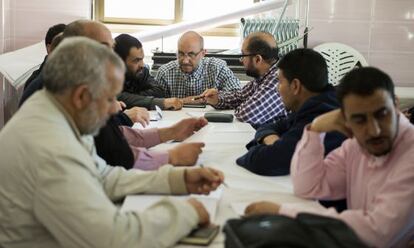Training a new breed of Muslim leaders to combat radicalism
Spain’s Islamic community is asking the state to help fund the creation of moderate imams


Around 20 imams from all over Spain sit around a table in the back of a mosque in an industrial park in the small town of L’Alcúdia, about 25 kilometers south of Valencia.
Most of them are Moroccan and speak Spanish haltingly. They are listening intently to an Islamic scholar who has come from the Netherlands to instruct them in Arabic rhetoric, a key skill in understanding the Koran that will prepare them for giving sermons.
Around one weekend out of every month, the imams meet in different parts of Spain as part of their training, and to receive a degree that is not recognized officially.
They often just pick anybody who seems to know a bit about the Koran – a cousin from Morocco who is said to know a lot”
Fouad Borni, course organizer
The courses are organized by the Spanish Federation of Islamic Religious Entities (Feeri) in partnership with the Islamic University of Rotterdam, and are the only regular training provided in Spain to Islamic clerics.
Representatives of the Muslim community here have repeatedly called on the government to get more involved in combating the spread of radical Islam and Salafism, arguing that the way to do this is by training imams who will be capable of offering an alternative message.
Spain’s imams must connect with young people, explain to them how to balance Western values with Islam, and prevent them from falling prey to radical preachers, say community leaders. “We’re not getting our own message about Islam across,” says Francisco Jiménez, Feeri’s secretary.
Imams are chosen by local religious communities, says Fouad Borni, who organizes the courses. “They often just pick anybody who seems to know a bit about the Koran – the most learned member of the community, or a cousin from Morocco who is said to know a lot. They should have an accredited qualification, they should be trained in Islamic law, in Arabic, and they should be able to interpret texts correctly, as well as have an understanding of Spanish law. But we’re light years away from that,” he says.
From the building site to the pulpit
An imam’s job is to lead prayer, and he is just one member of the team that runs a mosque. He can also act as a judge in family matters, as well as marry couples and provide religious assistance in prisons and hospitals.
“Many Spanish imams worked in the construction sector, and when the crisis hit, if they knew some parts of the Koran off by heart, they became imams. In general, in Spain they tend not to be very well educated,” says Fouad Borni, adding that the average wage for an imam is around €800 a month, which is generally paid for by the mosque’s parishioners.
“There is another problem: it is very difficult to train people with a Salafist background. They think they know everything. They only pay attention to what comes out of Saudi Arabia,” adds Borni.
The vast majority of imams in Spain – around 90 percent according to the Interior Ministry – are foreigners who often have little knowledge about Spanish society.
“There are some who come from Al Azhar [a prestigious Sunni learning center in Egypt] and they are very well educated, but they are not well adapted to the situation here. They start to demand things of people that don’t fit in with our culture. They don’t even want women going to the markets,” says Jiménez, who believes that Islam requires imams to know a great deal about the culture of the country where they are preaching. The Moroccan and Saudi governments’ attempts at influencing the appointment of imams is another source of controversy.
Yunes Mdaghri has come to Spain from the Netherlands to teach the weekend course in Valencia. “A lot of Muslims do not know their own religion properly, and tend to absorb whichever branch they come across. We have to equip imams with the ability to answer the questions they will be asked,” he says, adding that he is often asked by young men whether they should be fighting in Syria.
“I tell them ‘What on earth are you going to do in Syria? God isn’t asking you to go there.’ Sure, there are texts talking about jihad, but they don’t apply to Muslims living in Europe.”
Among the men attending the course, one stands out: 22-year-old Brahim Irdi, who wears his hair long and sports a denim jacket and running shoes. He is not yet an imam, and has come here from nearby Alicante. “I’m hungry to learn. The problem is that people believe what they see on YouTube, because the guy speaking has a beard and is wearing a white robe. They are dangerous. What is happening in the Islamic world is the result of ignorance,” he says.
The problem is that people believe what they see on YouTube. What is happening in the Islamic world is the result of ignorance”
Brahim Irdi, imam-in-training
This lack of solid role models is seen as a problem by many academics and experts who are familiar with the situation in Spain. Juan Ferreiro, a professor of law and author of El Islam en la Unión Europea. Centros de formación de imanes (Islam in the European Union. Training centers for imams), says the radicals have taken over the debate about where Islam is going. “We have to create alternative centers, where a debate about the limits of freedom of expression and women’s rights can take place, and that can be used to combat the spread of radicalism.”
Feeri is calling on the Spanish government to take a more coherent approach to overseeing the activities of imams. It says that many clerics feel they are under surveillance, but that they are offered no support when they try to offer a moderate alternative to radical Islam in their communities.
“I am constantly being called by the Civil Guard, by the Justice Ministry, by the police … they have us under observation, they ask us if we have seen anything unusual in the mosque, but they don’t help us in the task of making our young people feel Spanish,” says Said Tghos, an imam in the Madrid dormitory town of Parla.

Tghos has been living in Spain since 1998, and says that he is deeply worried about what he sees as the growing rift between the older and younger generations. “Young people feel discriminated against, disoriented, and so they use the internet to find out about Islam. I can’t change their mentality from one day to the next. The Islamic State has a lot of money and resources, and we have nothing to offer as an alternative.”
He says that more effort has to be made to show that Islam is compatible with Western values. “Spain is not Morocco; it’s clear that a conservative message will not work here. This is not an Islamic society. You have to interpret the texts depending on where you are.”
The problem that any young Spanish-born Muslim faces if he wants to study Islamic theology is that there are no centers in Spain, meaning he will likely travel to Egypt or Saudi Arabia, where teaching doesn’t necessarily fit in with the religious practices of European Muslims. Courses such as the one at L’Alcúdia are based on the model established at the Islamic University of Rotterdam, which tries to teach a mix of theological thinking. This model aims to become a European Islam, adapted to the West. Courses there last three years, and are delivered in Dutch.
The Pluralism and Coexistence Foundation, set up by the Spanish Justice Ministry, agrees that imams should attend officially recognized training courses, such as those that used to be offered by the UNED distance learning university, but says there is no funding available.
“The idea was to establish academic training in Islamic, Jewish, and Protestant theology, along with an institute of Islamic studies, but the crisis hit and the plans were parked,” says Fernando Arias, the foundation’s director. “Imams in Spain should have this training: somebody with the right education is a guarantee against radicalization.”
There are more than 1.5 million Muslims in Spain, and their numbers are growing. If they are to be fully integrated into Spanish society, key issues related to their religion, from burial practices to food or education, need to be addressed, says Arias, adding that trained imams could also help mediate in conflict resolution.
Shortly after midday, the students at L’Alcúdia close their notebooks and head for the recently opened mosque. They remove their shoes and kneel to pray on a dark crimson rug before lunch, after which they will continue their studies.
Tu suscripción se está usando en otro dispositivo
¿Quieres añadir otro usuario a tu suscripción?
Si continúas leyendo en este dispositivo, no se podrá leer en el otro.
FlechaTu suscripción se está usando en otro dispositivo y solo puedes acceder a EL PAÍS desde un dispositivo a la vez.
Si quieres compartir tu cuenta, cambia tu suscripción a la modalidad Premium, así podrás añadir otro usuario. Cada uno accederá con su propia cuenta de email, lo que os permitirá personalizar vuestra experiencia en EL PAÍS.
En el caso de no saber quién está usando tu cuenta, te recomendamos cambiar tu contraseña aquí.
Si decides continuar compartiendo tu cuenta, este mensaje se mostrará en tu dispositivo y en el de la otra persona que está usando tu cuenta de forma indefinida, afectando a tu experiencia de lectura. Puedes consultar aquí los términos y condiciones de la suscripción digital.








































